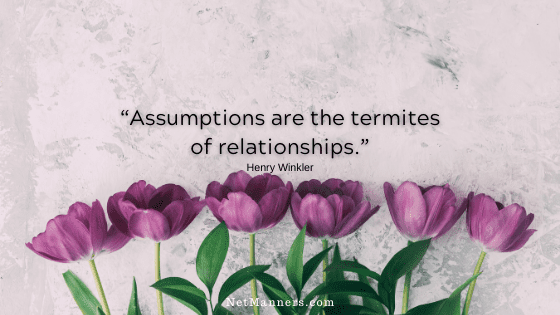How to Handle Misspelling Names in Email

I receive emails on this topic on a pretty regular basis: the misspelling of names. Many online users can relate, as many of us have had first-hand experience with this situation. Who hasn’t received emails from folks who misspell your name or assume what version of your name you go by?
Some who contact me about misspelling names in emails want to know how to handle the incorrect spelling of their name and how to correct the sender. They are frustrated as their signature file or the From field clearly shows the correct spelling of their name. So why do the senders still misspell your name?
It’s due to an increasingly common occurrence nowadays — lack of attention to detail. Next, what is the best way to correct the sender? And should they even bother correcting the sender? We will also discuss what to do if you are a misspeller.
Email Etiquette = Spelling Names as Displayed
A good rule of thumb is not to assume, change, or guess how a name is spelled. It is right there in the email and reflects how the recipient spells their name. Don’t take the liberty of deviating from that. (Of course, if this is someone you know very well, that’s an entirely different story.)
Speaking from decades of experience using emails, I can see that many people have the attention span of a gnat. I used to believe this to be an online-only phenomenon, but I see it just as much offline.
Most are so concerned about what they want to say that they ignore details. One of them being the correct spelling of the name of the person they are emailing.
Unless otherwise indicated, I don’t think that there is any animosity when your name is misspelled. It is simply an error that reflects the sender’s inability to pay attention to something as simple as how someone spells their name.
This is certainly not the type of error you want to make if you are serious about building relationships or making a positive impression. When communicating with new friends and contacts, always double-check the details.
Names are the Epitome of Personal
It is pretty standard for this to happen to me. I have folks who email me as “Judy”- I’m not a Judy—I am Judith. It’s not a big deal, but if you really knew me, you would know I never use Judy.
While these folks mean well, taking a too-informal approach can leave a negative impression, especially when wrong. Why would you change someone’s name to something other than how they sign off their email? Most likely, you want to appear friendly and more intimate than the relationship entails. That is not necessarily a bad thing, but there is the risk that the recipient may not appreciate that approach.
This certainly is not good for nurturing business relationships either. Formality in business is a sign of respect. This also applies to non-business communications, when the other side indicates a less formal approach is welcome.
How to Make the Correction
I tend not to say anything initially. I continue to sign off with my name, as displayed on every email I send. Depending on the topic at hand, I may also reflect a more formal tone. This will signal that their informal approach is not yet aligned with our relationship.
If the misspelling continues, that confirms that they ignore detail. Depending on the topic of communication, it may be enough for me not to encourage further contact.
If you want to make a quick correction, something like “BTW, I spell my name as….” with a 😉 Should work. The winky softens the correction and lets them know your preference. It is your name, after all.
What if you are the misspeller?
Quickly, humbly, and happily offer your sincere apology. “Oh, I’m so sorry. I didn’t mean any lack of respect.” One person noted that their sister was Judith, who went by Judy, so for him, it was natural—it made sense to me. Not that it bothered me at all. I don’t react to how my name is spelled unless it is a legal document.
Moving forward, make a point not to make that mistake again. That is until the other side notes an informal version of their name in their email sign-off. The type of relationship may depend on this, and it may never happen.
Making a Positive Impression
What does it say about a sender who spells your name differently than how it is displayed? It notes a lack of attention to detail and what they think is important. It also indicates that their motive is more about them than nurturing a conversation. And it makes me wonder what else they may not be paying attention to or think is necessary.
In my experience, this type of communicator also typically requires contacts to resend, repeat, or, in many cases, reiterate conversations or information we discussed in the past because they weren’t paying attention to details. It’s a feature, not a bug.
Now you can see how something as simple as assuming the informal version of someone’s name is spelled or not noticing you incorrectly spelling a contact’s name can leave a negative perception. So don’t be that guy or gal.
Take the time to try to ensure you spell your contact’s names correctly. Little “enuances” like this will go a long way to building strong and productive communications. Personally and for business as well.







